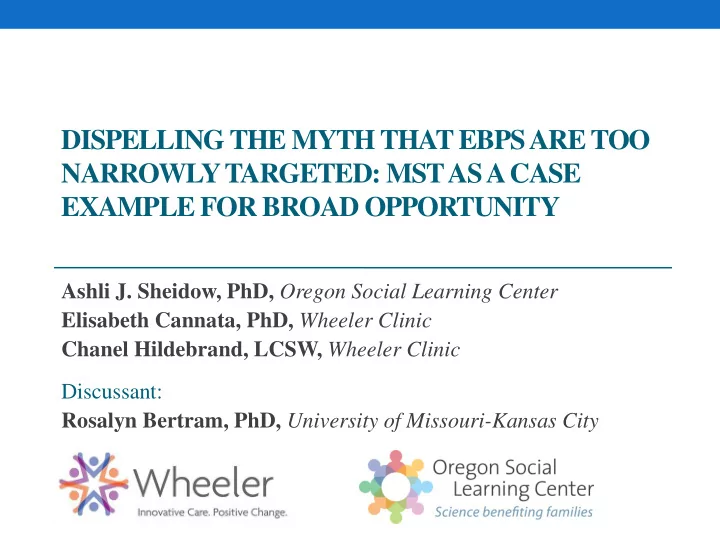

DISPELLING THE MYTH THAT EBPS ARE TOO NARROWLY TARGETED: MST AS A CASE EXAMPLE FOR BROAD OPPORTUNITY Ashli J. Sheidow, PhD, Oregon Social Learning Center Elisabeth Cannata, PhD, Wheeler Clinic Chanel Hildebrand, LCSW, Wheeler Clinic Discussant: Rosalyn Bertram, PhD, University of Missouri-Kansas City
AN ADOLESCENT EBP FOR COMMUNITY BEHA VIORAL HEALTH: A RESEARCH PERSPECTIVE Ashli J. Sheidow, PhD Oregon Social Learning Center (OSLC), Eugene, OR Contact: ashlis@oslc.org
Acknowledgements • Thanks to the various agencies for financial support:
Overview • Review of treatments for adolescents behaviors • Disruptive behavior • Substance abuse • Multisystemic Therapy (MST) • Delivery of this Evidence-Based Practice (EBP) in the “real world”
Adolescent conduct problems • Conduct-related problems are #1 • What percentage of juvenile offenders in the U.S. receive an evidence-based treatment? • A. 5% • B. 50% • C. 85%
Comprehensive review • 48 years of research • 7,216 abstracts • >400 papers reviewed • 86 empirical publications covering 50 unique treatment protocols • McCart, M. R. & Sheidow, A. J. (2016). Evidence-based psychosocial treatments for adolescents with disruptive behavior. Journal of Clinical Child & Adolescent Psychology, 45, 529-563. PMCID: PMC27152911
Review results • Well-Established Treatments • Multisystemic Therapy (MST) (Henggeler et al., 2009) • Treatment Foster Care Oregon (TFCO), formerly Multidimensional Treatment Foster Care (MTFC) (Chamberlain, 2003) • Probably Efficacious Treatments • Functional Family Therapy (FFT) when highly adherent (Alexander, Pugh, Parsons, & Sexton, 2000) • Aggression Replacement Training + Positive Peer Culture (Equipping Youth to Help One Another [EQUIP]) (Gibbs, Potter, & Goldstein, 1995) • Solution-Focused Group Program (Shin, 2009)
Adolescent substance abuse • Hogue, A., Henderson, C. E., Ozechowski, T. J., & Robbins, M. S. (2014). Evidence base on outpatient behavioral treatments for adolescent substance use: Updates and recommendations 2007–2013. Journal of Clinical Child and Adolescent Psychology, 43, 695-720. • Family-Based Ecological Treatments • MST & FFT are on both lists
Multisystemic Therapy (MST) • The research base • Prevent out-of-home placement • Home-based • 3-5 month treatment duration • Team of 2-4 therapists and a supervisor • 4-6 cases/therapist • 24/7 availability
Ecological Model of Problem Conceptualization Youth Family Peers School Neighborhood Community
Final Pop Quiz • Where is the best place to get yummy food in Tampa? • A. La Teresita Restaurant • B. Pipo’s Café • C. Columbia Cafe • D. Mandy’s Restaurant
EBPS AS OPPORTUNITY: PROVIDER PERSPECTIVE Elisabeth Cannata, PhD, Vice President Community-Based family Services & Practice Innovation Wheeler Clinic, Plainville, CT
Connecticut Service System • Since 2000 call to action, a continued commitment to provide interventions that : • Keep children and teens in their homes and communities • Promote strengths and strengthen families • Investment in broad statewide dissemination of an array of evidence-based or promising practice treatment models • Multiple models • Multi-system support • Investment in infrastructure to sustain rigor
About Wheeler Founded in 1968 • Commitment to meeting community need • Over 900 employees, 27 locations, over 100 • programs across lifespan and service continuum: • Prevention • Behavioral Health and Addiction Treatment • Child welfare/foster care • Care coordination • Special education • Justice • Integrated Healthcare
About Wheeler • Recognized as a leader in rigorous implementation of EBPs and partnerships to support model expansion for promising practices • In area of research-supported in-home family treatment: • Multisystemic Therapy • Multidimensional Family Therapy • Brief Strategic Family Therapy • IICAPS
MST Expanding Opportunity at an Organizational Level to Better Serve Communities: Accountability: • Offering treatments with proven track record • Clinician responsible for client engagement • Rigorous QA focused on model fidelity • Lessons about how we collect and review client data • Implementation Science • Clinician development Network Connections Consultant feedback and support – expands support to clinicians Connection to provider community Opportunity to identify community challenges/solutions Generate data to inform community needs
MST Expanding Opportunity to Promote Change Within Communities Ecological approach of MST: Inherent focus on community variables that contribute to • delinquency Clinicians focus on connecting families to supports in • their natural ecology and confronting barriers
BROAD SCOPE OF INTERVENTION WITH MST: CLINICIAN PERSPECTIVE Chanel Hildebrand, LCSW, Wheeler Clinic, Plainville, CT
“Finding the Fit” Family Community Behavior of concern School Individual Peers
Addressing Interactions Between Person and Environment • Parents and youth may identify problematic relationships with police, anti-social peers, or members of the community as primary contributing factors that reinforce maladaptive behaviors. • Parents often identify living in communities with high crime, low positive linkages with police, low community resources and school based services as primary areas of concern for their adolescents. MST clinicians develop direct interventions to foster and cultivate improved relationships between clients and these entities in ways that are appropriate and specific to that family.
Connecting Families In the Community • Building trusting relationships with law enforcement • Advocating for more community policing and outreach with local police departments • Police athletic leagues • Police explorers programs • Gang outreach • Increasing collaboration with schools and probation • Increasing community responsiveness and positive action • Increasing youth involvement in community pro-socials
Case Examples http://image.timesheraldonline.com/storyimage/NH/20150623/NEWS/150629952/AR/0/AR-150629952.jpg&maxh=400&maxw=667
Contact information: ecannata@wheelerclinic.org ashlis@oslc.org childebrand@wheelerclinic.org MST White Paper: Combatting Racial Disparity in the Juvenile-Justice System with MST is available at: https://cdn2.hubspot.net/hubfs/295885/white_papers/Comb atting_Racial_Disparities.pdf
Recommend
More recommend